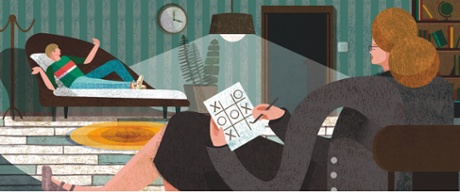
Everybody loves cognitive behavioural therapy. It’s the no-nonsense, quick and relatively cheap approach to mental suffering – with none of that Freudian bollocks, and plenty of scientific backing. So it was unsettling to learn, from a paper in the journal Psychological Bulletin, that it seems to be getting less effective over time. After analysing 70 studies conducted between 1977 and 2014, researchers Tom Johnsen and Oddgeir Friborg concluded that CBT is roughly half as effective in treating depression as it used to be.
What’s going on? One theory is that, as any therapy grows more popular, the proportion of inexperienced or incompetent therapists grows bigger. But the paper raises a more intriguing idea: the placebo effect. The early publicity around CBT made it seem a miracle cure, so maybe it functioned like one for a while. These days, by contrast, the chances are you know someone who’s tried CBT and didn’t miraculously become perfectly happy for ever. Our expectations have become more realistic, so effectiveness has fallen, too. Johnsen and Friborg worry that their own paper will make matters worse by further lowering people’s expectations.
All this highlights something even stranger, though: when it comes to talk therapy, what does it even mean to speak of the placebo effect? With pills, it’s straightforward: if I swallow a sugar tablet, believing it to be an antidepressant, and my depression lifts, then there’s a good chance the placebo effect is at work. But if I believe that CBT, or any therapy, is likely to work, and it does, who’s to say if my beliefs were really the cause, rather than the therapy? Beliefs are an integral part of the process, not a rival explanation. The line between what I think is going on and what is going on starts to blur. Truly convince yourself that a psychological intervention is working and by definition it’s working.
Perhaps every era needs a practice it can believe in as a miracle cure – Freudian psychoanalysis in the 1930s, CBT in the 1990s, mindfulness meditation today – until research gradually reveals it to be as flawed as everything else.
Or it could be that we’re changing as people. In 1958, a US psychoanalyst, Allen Wheelis, published a book arguing that Freudian analysis had stopped working because the American character had altered. In Freud’s day, Wheelis argued, people didn’t understand why they felt sad; psychoanalysis gave them explanations, whereupon they found it easy to transform their lives. Modern people were better at self-understanding, but they lacked the gumption to do anything about it. “Lacking the sturdy character of the Victorians,” as Roy F Baumeister and John Tierney put it in their book Willpower‚ “people didn’t have the strength to follow up on the insight and change their lives.”
The old techniques weren’t completely wrong; they’d just outlived their usefulness. If the secret of happiness is hard to find, maybe that’s because the answer keeps changing.
oliver.burkeman@theguardian.com

